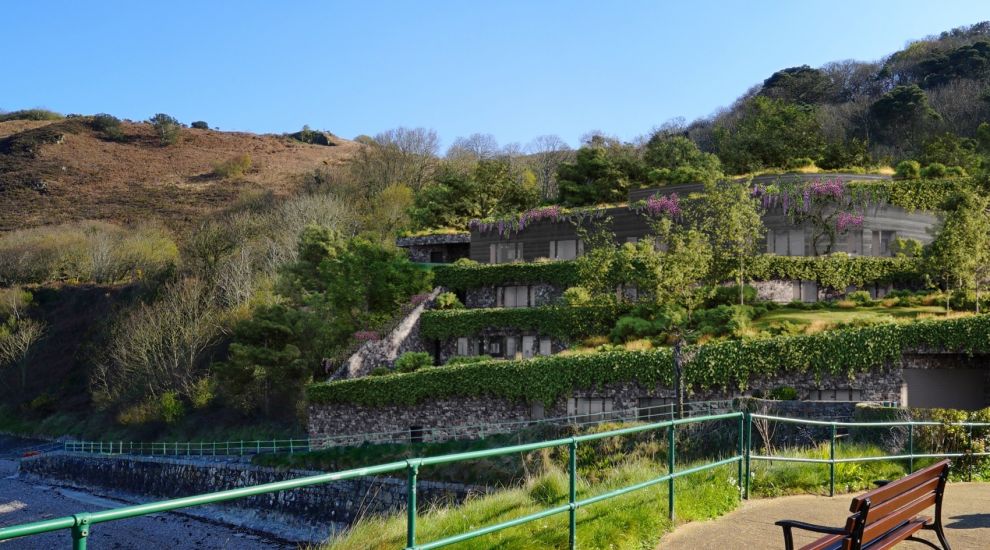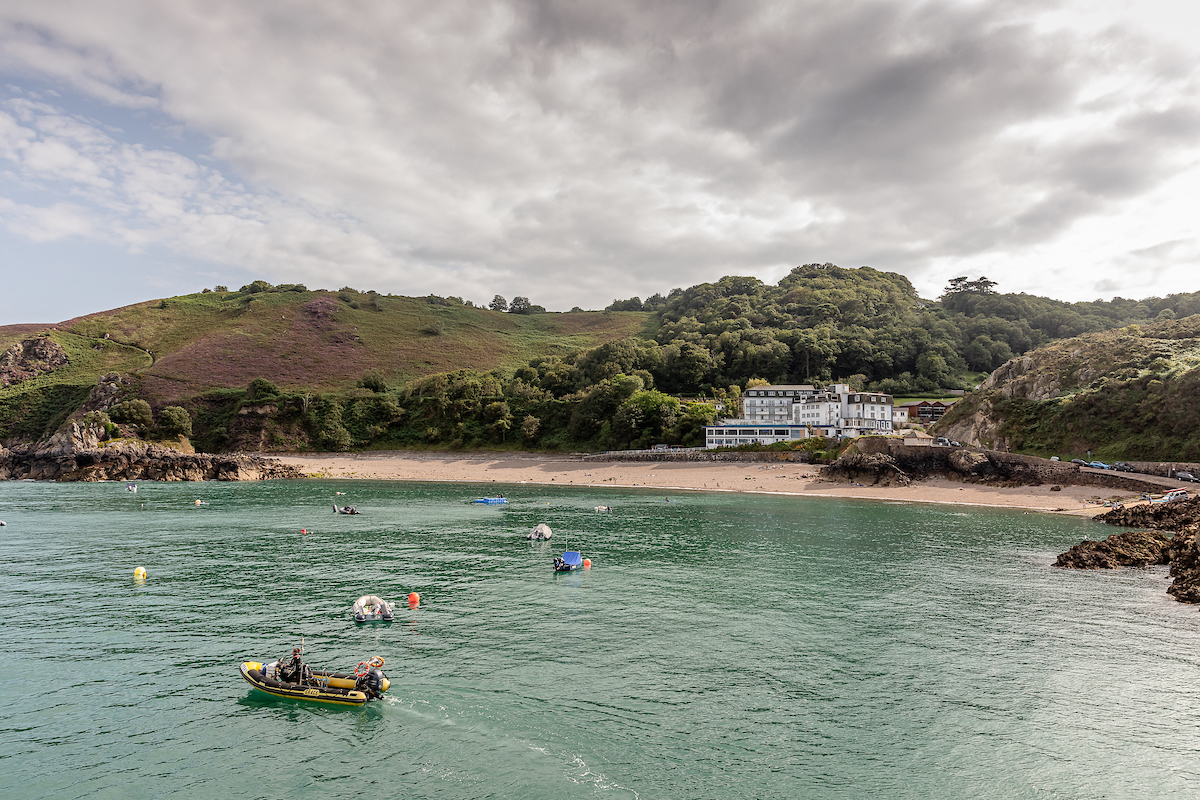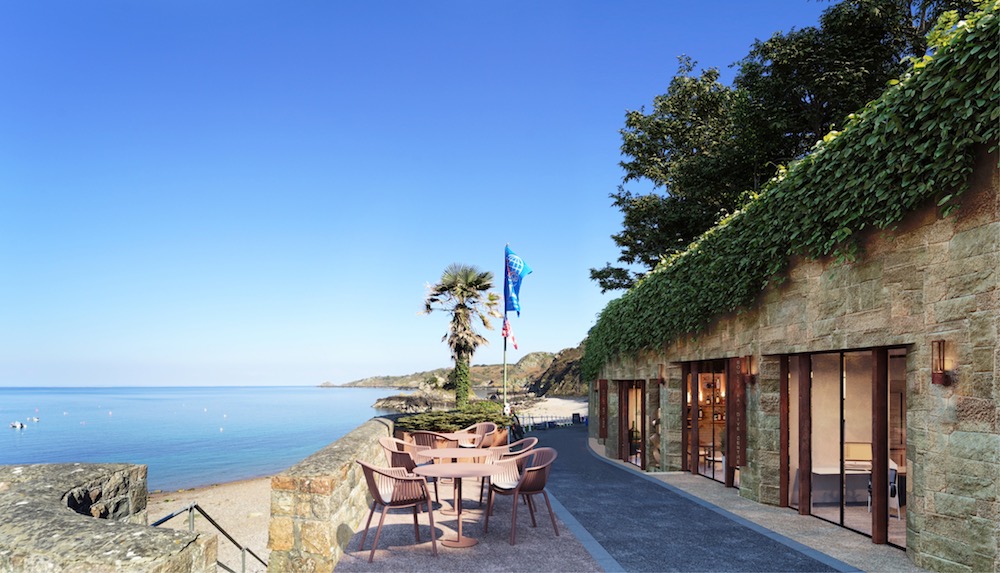


The Environment Minister's decision to hold a planning inquiry into the proposed redevelopment of the Water's Edge Hotel into a luxury home was a “classic case of predetermination”, the Royal Court has heard.
Last October, Environment Minister John Young announced that he would be referring a planning application to demolish the now-closed hotel and build a large single house, together with a new dive centre and café, to a public inquiry.
The owner, WE Limited, went to the Royal Court in February to argue that the basis of Deputy Young’s decision did not match the criteria for a public inquiry set out in the Planning Law.
WE Limited sought leave to appeal the decision, which was granted in April.
Represented by Advocate Rebecca McNulty, WE Limited argued in court this week that the basis of Deputy Young’s decision did not match the criteria for a public inquiry set out in the Planning Law.

Pictured: The new proposal would see a terraced granite home built on the site at Bouley Bay to replace the current deteriorating hotel.
The decision was made under an article of the Planning Law which allows a public inquiry to be carried out if the development in question will have “significant effect on the whole or a substantial part of the population of Jersey”.
Advocate McNulty presented that there was a “gaping hole” in the Minister’s decision – asking the court what the supposed “significant effect” was.
Advocate McNulty also argued that the power for the Minster to intervene is only to be used for “the largest, most controversial developments” and argued that “Water’s Edge is not one such development”.
She referenced instances in which this article has been used before to hold a planning inquiry, including for the General Hospital and the new Les Quennevais School site, stating that “those developments are clearly very different to the proposed developments at Water’s Edge”.
Constable of Trinity and Chair of the Planning Committee, Philip Le Sueur also commented in a letter to the media that he was not aware of a public inquiry ever being called for single public dwelling before. He also questioned why the Water’s Edge development had been singled out when recent developments at Greve de Lecq and Cyril Le Marquand House were not.
Advocate McNulty also suggested that emails sent by Deputy Young to various people showed that the decision to call a public inquiry was a “classic case of predetermination” alleging that “the Minister had already closed his mind off”.
Last August, Deputy Young wrote to officers in his department in connection with the “Bouley Bay development” saying: “In view of the huge public response and importance of our CNP [Coastal National Park]. I hereby call this application into a planning inquiry. Please acknowledge and confirm my instruction. Not negotiable. Regards John.”

Pictured: A new café would also be created as part of the development.
Advocate McNulty suggested that the “public response” was not “huge”, and actually only consisted of 188 public letters which she said “is not a substantial part of the population of Jersey”.
She also added that the contents of the letter were important to consider, with less than a fifth expressing any concern about the development being for a singular family. 124 of the letters were mainly worried about the loss of the dive centre, café and footpaths – issues which have since been resolved.
When previously granting WE Limited leave to appeal the Minister’s decision, Bailiff Timothy Le Cocq had concluded that “the expression ‘not negotiable’ requires in the context of this matter some explanation.”
Advocate McNulty noted that there had still not been an explanation provided for the Minister’s use of the phrase “not negotiable”, describing it as “telling” that there was no affidavit from Deputy Young who had a responsibility to “answer for and defend ministerial decisions”.
Represented by Advocate James Rondel, the Minister disputed each of WE Limited’s grounds and invited the court to dismiss the application for appeal, arguing that the emails sent in August reveal “predisposition rather than predetermination”.
Advocate Rondel also argued that the development of upwards of 3,000 square metres on the Coastal National Park would not be in line with the Island Plan, suggesting that the development would impact “historical and cultural activities” at Bouley Bay.
He added that the Environment Minister “had in mind the primary purposes of the Island Plan and pressing need for housing” when making his decision to call a public inquiry.
Advocate Rondel also explained that the Jersey Light Car and Motorcycling Club, the National Trust, and the Diving Club all represent large groups of people who expressed their concern regarding the development.
In reference to the emails, Advocate Rondel argued that they must not be treated in isolation from other correspondence and events. He said that there was too much focus on “a couple of words in an email rather than the whole situation”.
He said that the “decision making process is greater than the transmission of a single email”, adding that the Minister should “not be treated as if he exists in a vacuum” and should have “access to officer advice” and the “collective expertise of the department”.
Commissioner Clyde-Smith was presiding and reserved judgement. The full judgement will be handed down at a later date.
Comments
Comments on this story express the views of the commentator only, not Bailiwick Publishing. We are unable to guarantee the accuracy of any of those comments.